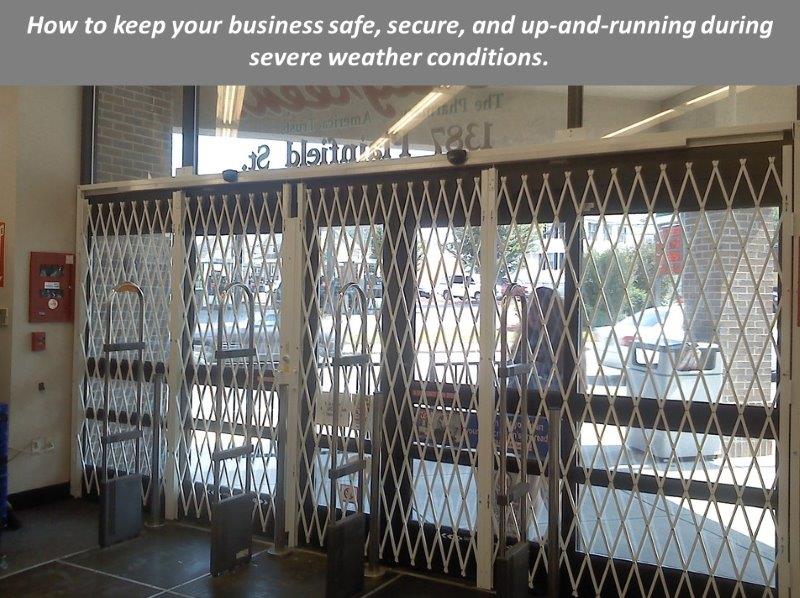Protecting your Business from Weather
Extreme weather conditions and natural disasters can cause significant damage to properties of all types, including businesses. That’s why it’s important to take steps to protect your property – and your business operations – from these situations.
One of the first things you should do is ensure that your physical property is protected. Storms and other natural occurrences can cause serious damage. Physical security tools can reduce the likelihood of damage and keep your property safe.
When installed on doors and windows, physical security gates make it significantly less likely that glass will be broken. Not only does this help protect your property from fallen debris (such as tree branches, garbage cans, mail boxes, etc.) that could be sent flying through the air in a severe storm, but it also keeps your business safe from criminals who may take advantage of severe weather to commit crimes.
During an episode of extreme weather, electricity may not function correctly, and police and emergency services will likely be extremely busy. This means that alarm systems may not work when they should, and there’s a good chance that police won’t be able to quickly respond to crimes in progress. Having physical security installed keeps your business safe. Physical security gates don’t need electricity to keep criminals out.
Security gates are also very quick to lock into place, letting you secure your business very quickly.
In addition, the security provided by physical gates will also assist in keeping your employees safe if they are on-site during an emergency situation.
Business Continuity
Of course, in addition to protecting your physical property, it’s also important that you have a plan for business continuity in the event of a disaster. Having a business continuity plan is so important because it keeps the critical operations of your business working even during severe weather and natural disasters.
While a continuity plan will be different for each business, there are several steps that you should consider including in your plan:
- Identify the threats that could potentially place your business at risk
- Determine the business activities that are necessary for continuous operation of your business
- Create a plan that ensures your crucial business activities can continue in a disaster
- Identify the key individuals who will execute the plan and ensure that they are aware of their roles
- Have an external communication plan that lays out how you will contact clients, partners, employees, etc. in the event of an emergency
- Create a plan to keep your employees and customers safe during an emergency
Depending on your business, you may wish to have emergency generators available to power your business, or at least key aspects of your business, during an emergency situation. You will also need to ensure that your company’s data is secure. All critical data should be backed up at secure off-site locations that are far enough away that it is unlikely they will suffer severe weather at the same time as your business. It’s vital that you have a way to access your backups in the event of an emergency.
Make sure that your business continuity plan is communicated to all employees and that anyone who has key roles in carrying out the plan is aware of their roles.


